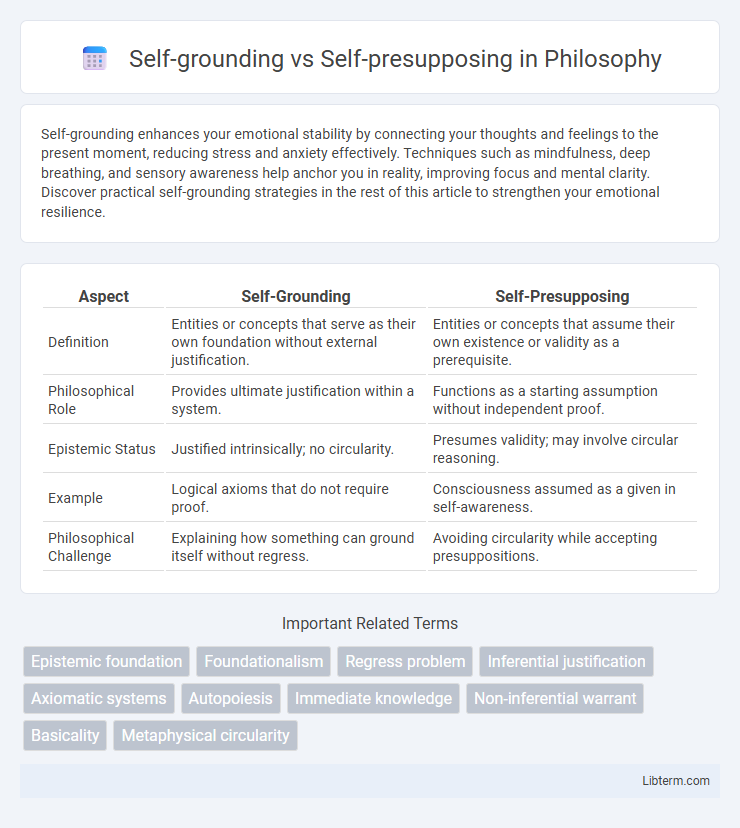Self-grounding enhances your emotional stability by connecting your thoughts and feelings to the present moment, reducing stress and anxiety effectively. Techniques such as mindfulness, deep breathing, and sensory awareness help anchor you in reality, improving focus and mental clarity. Discover practical self-grounding strategies in the rest of this article to strengthen your emotional resilience.
Table of Comparison
| Aspect | Self-Grounding | Self-Presupposing |
|---|---|---|
| Definition | Entities or concepts that serve as their own foundation without external justification. | Entities or concepts that assume their own existence or validity as a prerequisite. |
| Philosophical Role | Provides ultimate justification within a system. | Functions as a starting assumption without independent proof. |
| Epistemic Status | Justified intrinsically; no circularity. | Presumes validity; may involve circular reasoning. |
| Example | Logical axioms that do not require proof. | Consciousness assumed as a given in self-awareness. |
| Philosophical Challenge | Explaining how something can ground itself without regress. | Avoiding circularity while accepting presuppositions. |
Defining Self-Grounding: A Semantic Overview
Self-grounding refers to the property of a concept or statement that derives its validity or truth solely from itself, independent of external references or contexts. This semantic characteristic contrasts with self-presupposing, where the meaning or truth of a statement inherently assumes or depends on prior knowledge or conditions. Understanding self-grounding involves analyzing how certain propositions maintain semantic coherence by internally generating their own justification or meaning.
Understanding Self-Presupposing: Core Concepts
Self-presupposing involves assumptions embedded within statements that must hold true for the statements to be meaningful, distinguishing it from self-grounding which relies solely on internal consistency for validation. Central to understanding self-presupposing is recognizing that some propositions carry implicit background conditions or shared knowledge necessary for interpretation. This concept is crucial in fields such as linguistics, philosophy of language, and cognitive science, where clarity of communication and inference depend on identifying and managing presuppositions effectively.
Historical Development of Self-Grounding and Self-Presupposing
The historical development of self-grounding traces back to foundational discussions in metaphysics, emphasizing the principle that an entity can justify its own existence or properties without external reference, a concept explored by philosophers like Ross and Fine in the 1980s. Self-presupposing, originating from linguistic and philosophical logic inquiries, examines how certain statements or entities implicitly assume their own existence within discourse, with key contributions from Strawson in the mid-20th century. These divergent but related concepts have evolved to deepen understanding of self-referential justification and implicit assumptions within ontology and semantics.
Key Distinctions Between Self-Grounding and Self-Presupposing
Self-grounding involves a proposition providing its own justification independent of external beliefs, whereas self-presupposing requires the acceptance of certain background assumptions to be meaningful. The key distinction lies in epistemic autonomy: self-grounding claims attain validation intrinsically, while self-presupposing statements depend on prior commitments for their truth conditions. Understanding these differences clarifies debates in epistemology regarding foundational beliefs and circularity.
Philosophical Foundations of Self-Grounding
Self-grounding in philosophy refers to entities or truths that provide their own justification without relying on external factors, emphasizing intrinsic explanatory power. Self-presupposing involves assumptions or concepts that inherently depend on themselves for validation, creating a circular dependency. The philosophical foundations of self-grounding explore how entities can be both the source and the justification of their existence, challenging traditional causal hierarchies and epistemic frameworks.
Semantic Structures of Self-Presupposing Statements
Self-presupposing statements contain inherent semantic structures that require a presupposition to be true for the statement to hold meaning, distinguishing them from self-grounding statements that rely solely on their own content. These semantic structures often involve background assumptions or implicit information necessary for interpretation, such as existential presuppositions embedded in definite descriptions or factive verbs. Understanding the semantic role of presuppositions reveals how meaning extends beyond explicit content to include presupposed knowledge, shaping communication and inference in natural language.
Real-World Applications: Self-Grounding vs. Self-Presupposing
Self-grounding systems establish their knowledge base through direct interaction with real-world data, enabling adaptive decision-making in dynamic environments such as robotics and autonomous vehicles. In contrast, self-presupposing systems rely on pre-established assumptions or frameworks, often utilized in natural language processing and knowledge representation to interpret context-sensitive information. The practical distinction affects system reliability and flexibility, with self-grounding enhancing responsiveness while self-presupposing supports structured inference in complex scenarios.
Logical Implications and Paradoxes
Self-grounding involves statements whose truth is established by their own content, leading to logical implications that support self-justification without external validation. Self-presupposing statements inherently assume their own truth, which risks circular reasoning and paradoxes such as the Liar Paradox when applied unrestrictedly. Logical implications of self-grounding contribute to foundational coherence, while self-presupposition challenges classical logic by introducing semantic paradoxes that question consistency and truth conditions.
Critiques and Counterarguments in Contemporary Philosophy
Critiques of self-grounding highlight its vulnerability to circular reasoning, questioning whether a proposition can coherently serve as its own foundation without external validation. Counterarguments emphasize that self-grounding offers a parsimonious framework for explaining foundational knowledge without invoking infinite regress, contrasting with the challenges faced by self-presupposing accounts that rely on pre-existing assumptions. Contemporary philosophy debates often center on whether self-presupposing inherently assumes what it aims to prove, thus potentially undermining its justificatory power compared to self-grounding approaches.
Synthesis: Integrating Self-Grounding and Self-Presupposing
Self-grounding and self-presupposing concepts can be synthesized by recognizing that self-grounding provides foundational justification for beliefs, while self-presupposing involves assumptions necessary for coherent cognition. Integrating these frameworks enables a comprehensive understanding of how individuals establish epistemic authority and maintain consistency in their reasoning processes. This synthesis enhances models of self-reference by bridging the gap between justificatory grounding and implicit presuppositions in cognitive systems.
Self-grounding Infographic

 libterm.com
libterm.com